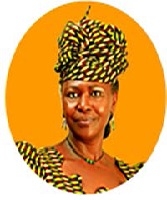
Angelina Chogo WAPAKHABULO
YEAR OF MATRICULATION: 1968
EDUCATION:
Angelina Chogo, as an undergraduate, is remembered very well for her gift of ‘stage performance’, with an artistic mastery of conversational exchange coupled with symbolic body-language, both these rhyming along with action. Her training, along with that of her fellow artistes, was at the time of a highly spirited Department of Theatre Arts that was seeking to clearly define and demonstrate the place, the objectives and the expected impact of ‘theatre’ for an independent African nation. It was seeking to use theatre ‘not so much in the Western classical tradition of stage, performers and audience but, rather, in a dynamic sense of symbolic performance that evoked images aimed at representing real life through action. Chogo was part of the new generation of African intellectuals?along with the versatile Penina Muhando, May Materu and others?under the clearly-charged departmental leadership of Professor Bob Leshoai as he took over from the founding head Professor Herbert Shore. Like Muhando [Mlama], Angelina was identified by the Department for retention because
of, among other things, managing well three highly-prized undergraduate Swahili plays, including ‘Wala Mbivu’. It was at this critical moment of identification for staff development, however, that she had to make a choice between two equally competing options - where her story would begin of a head-on journey to Uganda.
Among the many admirers of her university works was a fellow UCD student at the then Faculty of Law [now the School of Law], by the name of James Francis Wambogo Wapakhabulo. He hailed from Uganda. The mutual love that got lost between the two had eventually led to a matrimonial bond at a church altar. James Wapakhabulo was a contemporary and fellow-revolutionary with other Ugandan students at the University: Yoweri Kaguta Museveni, Eriya Kategaya, David Anyoti, Osinde Wangor, Ben Wacha, Amanya Mushega and others?a group that came to guide and shape Ugandan
politics of development?all of whom were so enthusiastic and so expectant about the Wapakhabulo-Chogo matter.
In Uganda, from her early days of arrival in her new home-country, Angelina Wapakhabulo played a number interwoven and influential community roles, including social work and community leadership first within her husband’s home district Sironko in Mbale. Later, she was to become one of the most celebrated community leaders, activists and social workers at the national stage. The long list of charitable organizations she has been associated with includes the United Way Uganda (as a founding member and founding co-chair of its governing board); CURE Uganda [a specialty teaching hospital that treats children afflicted by neurosurgical conditions]; the Uganda Women’s Effort to Save Orphans (UWESO); The AIDS Support Organisation (TASO); Forum for African Women Educationalists Uganda (FAWE-U); SOS Children’s Village Uganda; the Uganda Red Cross; as well as Women International
Maternity Aid (WIMA). From 2004-2008, she served as a member on the Kyambogo University Council. On the international scene, Mrs Angelina Wapakhabulo served for a considerable period of time as a Uganda community member of the Steering Committee for the Development of Anti-Retroviral Therapy Trials (DART) in Africa, and has been on the Board of the AIDS Healthcare Foundation and the Microbicide Development Programme Steering Committee (under the Imperial College London) in the fight against HIV/AIDS in Uganda. It is soothing to learn that Mama Angelina and several community-development enthusiasts have been transforming Kampala’s markets into ‘one-stop shopping centres’ for vendors and customers in an effort to
promote public access to HIV/AIDS information and treatment.
In 2009, Angelina was appointed by President Museveni as Uganda’s High Commissioner to Kenya, a position she served so well for seven years up to 2016.
Mama Angelina got this appointment at a time of a diplomatic row between the two countries which came to the fore in February 2009. Uganda was claiming possession of the small island of Migingo on Lake Victoria and requiring Kenyan fishermen living on the island to purchase special permits from the Ugandan government while, on the other hand, Kenya claimed ownership of the island, invoking the original colonial maps and boundaries. The ending of hostilities between the two neighbouring countries, in June/July 2009, must have involved, among others, the two countries’ high commissioners in fast yet classified consultations and negotiations on behalf of their governments. Mama Angelina, as they often refer to her, must have played a crucial though invisible role.
Angelina, widowed since 2004, lives happily in close touch with her family of grown-up and independent children, while maintaining fond relations with relatives in her Sironko district. It is needless to say that H.E. Mama Angelina was not only a faithful Ugandan servant as high commissioner to Kenya but also that she is a perfect ambassador of the Tanzanian society and culture in Uganda.

